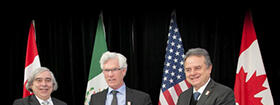North American Integration: infrastructure and transportation for competitiveness
This article in Alliance magazine addresses the continuing importance of supporting the economic integration of North America through NAFTA and its partners in the United States, Mexico and Canada. Also examined is the ongoing effort to ensure the increased productivity and competitiveness of the partners as a joint export platform and single negotiating block.
There is also a summary of recommendations that were presented to U.S. President Barack Obama, Mexican President Enrique Peña Nieto and Canadian Prime Minister Justin Trudeau at the North American Leaders' Summit in Ottowa in June.
A primer to the North American Leaders' Summit
The Canadian Global Affairs Institute released a primer by CGAI Vice President and Fellow Colin Robertson.
On Wednesday, June 29th, Canadian Prime Minister Justin Trudeau will host US President Barack Obama and Mexican President Enrique Peña Nieto for the tenth North American Leaders’ Summit (NALS).
All three leaders want this meeting to succeed. For President Obama, it will advance his climate agenda continentally and help to cement his legacy in managing good neighbourhood relations. Climate also rates high in President Peña Nieto’s agenda, along with improving access for Mexican goods and mobility for Mexicans within North America. In terms of Canada-Mexico relations, President Peña Nieto expects Prime Minister Trudeau to announce the lifting of the obnoxious Canadian visa requirement.
This primer covers key issues on the agenda, likely outcomes from the discussion, and both the historical and current context needed to better understand these bilateral and trilateral relationships.
Read more on the CGAI website.
Image: Susan Walsh/The Associated Press
Mal momento para Norteamérica

De un lado y otro del espectro político, están demócratas y republicanos, con retóricas en contra del libre comercio.
Los candidatos a la nominación presidencial de Estados Unidos llevan varios meses en campaña, en búsqueda de ganar la mayoría de delegados que les permita ser designados para competir por la Presidencia en las elecciones de noviembre.
De un lado y otro del espectro político, están demócratas y republicanos, con retóricas en contra del libre comercio. Esta actitud es normal entre los candidatos liberales, quienes apoyados por los sindicatos, siempre se han opuesto a acuerdos que puedan significar la pérdida de trabajos en determinadas industrias protegidas. Honrosa excepción fue el presidente Bill Clinton, al apoyar el Tratado de Libre Comercio de América del Norte (TLCAN). Actualmente, ambos candidatos demócratas, Bernie Sanders y Hillary Clinton, han atacado el libre comercio y se han pronunciado en contra del acuerdo contemporáneo más importante, el Acuerdo Transpacífico de Cooperación Económica (TPP, por sus siglas en inglés), del que México es parte, junto con sus dos socios de América del Norte.
More Than Trade: Capitalizing on North American Co-Production

Sapn Gupta
Arizona Town Hall - May 23, 2016
Canada, Mexico and the U.S.’s are each other’s most important trading partners, with 34% ($517 billion) of the U.S.’s total exports of $1.5 trillion in goods exported to these two countries alone in 2015. The U.S. imported a combined $590 billion in goods from Mexico and Canada, 26% of the $2.2 trillion total imported in 2015. Therefore, it is no surprise that Canada and Mexico are Arizona’s largest trade partners as well, with Arizona exporting $9.16 billion in goods to Mexico and $2.21 billion to Canada, over 50% of the state’s $22.6 billion in exports in 2015.
Three Amigos Summit

"Le sommet des chefs d’État du Canada, des États-Unis et du Mexique, qui aura lieu le 29 juin 2016 à Ottawa, offre la première occasion aux trois dirigeants de dresser un bilan des enjeux continentaux communs en matière d’énergie et d’environnement, suivant l’Accord de Paris sur le climat signé en décembre dernier. À l’issue de la rencontre, ils annonceront sans doute un protocole d’entente visant à coordonner les recherches sur le climat et à partager des technologies réduisant les émissions de gaz à effet de serre (GES), mais nous ne devrions pas nous attendre à beaucoup plus. Si les trois pays sont des producteurs importants d’hydrocarbures, leurs défis en matière de politiques environnementales ne sont pas les mêmes, car leurs bilans énergétiques diffèrent. De plus, la présidentielle américaine du 8 novembre prochain verra un changement de garde, et Barack Obama ne sera pas en mesure de s’engager trop loin dans le « climat » politique actuel."